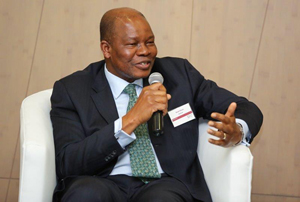 Dr Reuel Khoza |
In growing and nurturing key projects and initiatives, the university hosted more than fifty partners and alumni at a business breakfast in Sandton, Johannesburg on 27 August 2014. The occasion was conceived by Institutional Advancement in collaboration with the Office of the Vice-Chancellor and Rector.
Discussions focused on the central role which institutional partnerships play in growing the university’s capacity to extend its reach in supporting schools and growing technologically-based educational tools for disadvantaged communities around the Free State and the country at large.
In his remarks, Prof Jansen thanked partners for their continued support and for joining hands with the university in supporting key projects and initiatives that have improved the level of education in the Free State, provided skills development and nurtured young leaders.
The guest of honour Dr Reuel Khoza, non-Executive Chairman of Nedbank and co-host Dr Marcus Ingram, Director of Institutional Advancement, discussed the role of meaningful leadership in the African context and social and political structures that are instrumental in developing future leaders. As stated simply but powerfully by Dr Khoza, “If not us, then who?”
In attendance were heads of corporations, key role players in partner organisations and NGOs, alumni and Corporate Social Investment specialists from leading financial institutions.